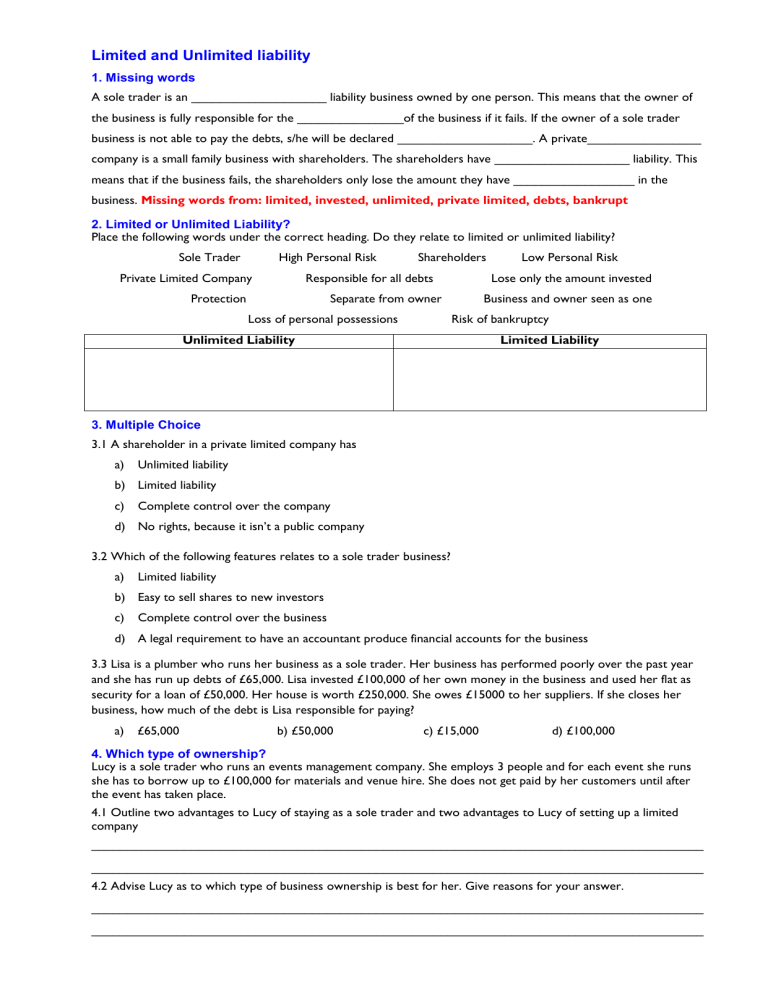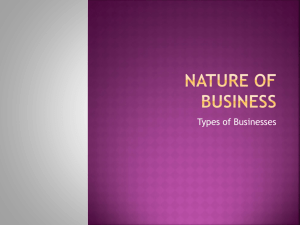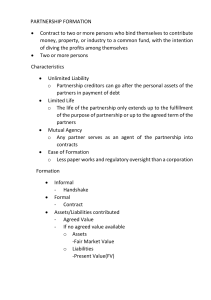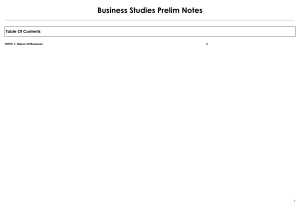
Limited and Unlimited liability 1. Missing words A sole trader is an ___________________ liability business owned by one person. This means that the owner of the business is fully responsible for the _______________of the business if it fails. If the owner of a sole trader business is not able to pay the debts, s/he will be declared ___________________. A private________________ company is a small family business with shareholders. The shareholders have ___________________ liability. This means that if the business fails, the shareholders only lose the amount they have _________________ in the business. Missing words from: limited, invested, unlimited, private limited, debts, bankrupt 2. Limited or Unlimited Liability? Place the following words under the correct heading. Do they relate to limited or unlimited liability? Sole Trader High Personal Risk Private Limited Company Shareholders Responsible for all debts Protection Lose only the amount invested Separate from owner Loss of personal possessions Low Personal Risk Business and owner seen as one Risk of bankruptcy Unlimited Liability Limited Liability 3. Multiple Choice 3.1 A shareholder in a private limited company has a) Unlimited liability b) Limited liability c) Complete control over the company d) No rights, because it isn’t a public company 3.2 Which of the following features relates to a sole trader business? a) Limited liability b) Easy to sell shares to new investors c) Complete control over the business d) A legal requirement to have an accountant produce financial accounts for the business 3.3 Lisa is a plumber who runs her business as a sole trader. Her business has performed poorly over the past year and she has run up debts of £65,000. Lisa invested £100,000 of her own money in the business and used her flat as security for a loan of £50,000. Her house is worth £250,000. She owes £15000 to her suppliers. If she closes her business, how much of the debt is Lisa responsible for paying? a) £65,000 b) £50,000 c) £15,000 d) £100,000 4. Which type of ownership? Lucy is a sole trader who runs an events management company. She employs 3 people and for each event she runs she has to borrow up to £100,000 for materials and venue hire. She does not get paid by her customers until after the event has taken place. 4.1 Outline two advantages to Lucy of staying as a sole trader and two advantages to Lucy of setting up a limited company ______________________________________________________________________________________ ______________________________________________________________________________________ 4.2 Advise Lucy as to which type of business ownership is best for her. Give reasons for your answer. ______________________________________________________________________________________ ______________________________________________________________________________________ 55. ANSWERS - Limited and Unlimited liability 1. Unlimited...debts...bankrupt...limited...limited...invested 2. Unlimited Liability Limited Liability Sole Trader Shareholders High Personal Risk Low Personal Risk Responsible for all debts Private Limited Company Business and owner seen as one Lose only the amount invested Risk of bankruptcy Separate from owner Loss of personal possessions Protection 3.1 B 3.2 C 3.3 A 4.1 Advantages of sole trader– control, keeps all profits, privacy; Advantages of limited – limited liability, less risk, access to capital 4.2 Student choice and justify





